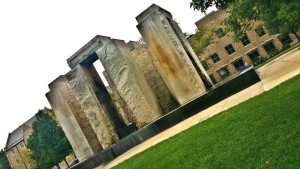A post from our student blogger Nicole
Today I want to tell you about another funny teacher we have; our Patent Searching teacher. For those of you that don’t know, Patent Searching is about in depth searching for prior patents that may be relevant to the patent you’re working on through multiple databases. By relevant I mean any patent already published or filed that is similar, but not the same exact thing, to the patent you will be working on. The teacher is quite funny. It’s especially funny when he makes up his own lingo, for example, he told us the code on one of the databases was the cuckoo code. He’s always cracking jokes in class and telling us about his awesome trips, for instance, his trip to Japan for a searching competition. How awesome is that? And what was even better was that he brought back a treat for everyone. Green tea kitkats! It does sound a little strange but they were actually really good!
Now getting into the actual details of the class. There are multiple databases used in this class to help you search for relevant patents to your capstone project. All of these databases have their ups and downs, but you will learn what you prefer the most. As for me and my mouse device, I’m having a bit of trouble searching for any relevant patents. My biggest problem is the word mouse. When you search it you get results for a computer mouse rather than lab mice. This is a perfect example of how literal and difficult these databases can be. But don’t let that intimidate you because you learn how to fix this problem with the help of this class. That’s why this class is so important! There is so much technique that goes into searching that I had no idea about. It’s quit fascinating to learn about all the little tricks that go into searching. They become very convenient when you work on your capstone project. The homework assignments are a huge help as well and don’t be afraid to talk to the teachers because they are very willing to help out!
The teacher likes to end his lectures by asking if anyone has questions and when nobody raises their hand he says so everybody knows everything. Just another way to make his class laugh. Like he said a lecture is more memorable with a laugh.
